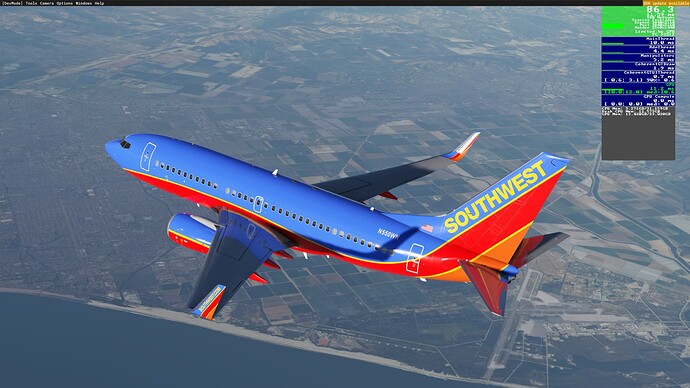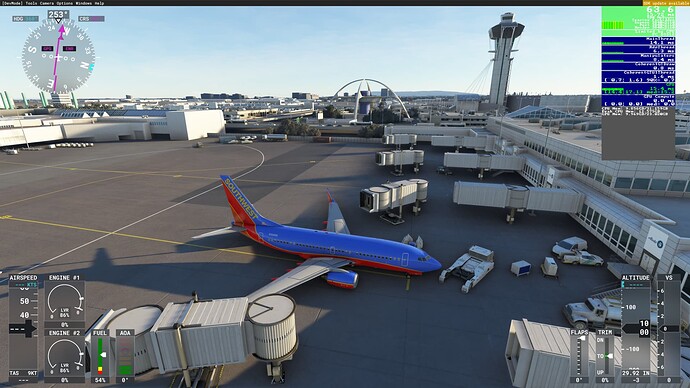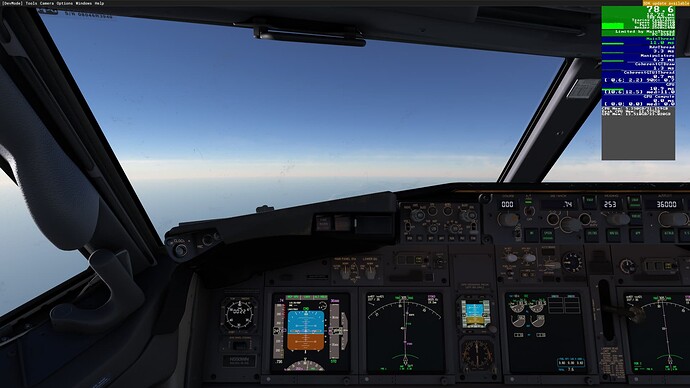Just swapped out to an AMD 7700X with DR5 6000mhz RAM thanks to an early black friday sale. I am very pleased with the gains despite keeping the same RTX3090. The graphics card is finally actually getting some load now in both 4K TAA and DLSS both Ultra. 60 FPS on ground in KLAX and +85 fps the air with PMDG 737 and FSLTL (9-14ms response). Previously I was limited by main thread on a 5600x to 45 FPS max in KLAX with >20ms response and 55-65 at cruising altitude with 16-18ms response. I have the processor on an all core -30 curve optimizer and 85W TDP. Temps are around 60c.
There’s no way an all-core -30 on the curve optimizer is stable unless you have a golden sample. Undervolting is hard to test, since it’s the power spikes from idle that causes crashes. You might be fine gaming since there’s always a load above idle, but you’ll probably get the random WHEA restarts when opening programs at light loads.
I would suggest using CoreCycler to find the unstable cores to save yourself some headaches. There’s always a few cores that need more voltage to be stable - those are the ones you want to identify.
I ran corecycler for 1 iteration and all is fine. I realized core cycler just runs prime95 and I have already run a blend of torture tests over night with prime95 without issues.
You need to run multiple iterations over multiple hours. Sometimes an error won’t get thrown until a later pass.
Yes and no. It uses Prime95, but cycles the load to simulate different transient loads that can make undervolting unstable. Running Prime95 continuously as a stability test is pointless for undervolting, as crashes occur during fluctuating power loads and not during full power. You can pass Prime95 all night with undervolting, then get a BSOD opening Chrome.
sure ill let it run overnight. its just finishing second iteration now.
so ran 16 iterations no crash over night. i think there was 1 iteration where core 5 thrown an error, but overall 15 of the iterations were clean. i reduced core 5 CO to -25 and kept rest at -30 and so far i don’t see any more errors.
Awesome, looks like a good chip. Just run an iteration every once and a while to keep checking. I remember after I got my 5950X dialed in with CoreCycler, I still got some random errors every few months.
yah not bad, the whole package cost me $1100 to upgrade from 5600x and im future ready once 7800x3d drops in january.
Haha this is exactly what I did.. Got the 7700x just to swap out for the next 3D chip! Hopefully it will be here soon.
I did a similar upgrade just before Christmas and have been surprised and delighted by the improvement.
I upgraded from a 5800x and 32Gb DDR4 3600 RAM to the 7700x and 32Gb DDR5 5600 RAM. Because of the socket change, it needed a new motherboard - I went for the cheaper ASUS x670 Prime that all the reviewers seem to hate.
I fly exclusively VR (HP Reverb G2) and did the upgrade more as a preparatory stage before a potential GPU upgrade from my 3080Ti to a 4***series once prices made that possible hopefully sometime in 2023, and wasn’t expecting much immediate improvement.
But it’s great. I was immediately able to raise the Terrain LOD from 170 to 300 and the Objects LOD from 140 to 200 with no impact whatsoever on smoothness. And the improved clarity - especially over cities - was impressive.
Yesterday, I decided to stress test it with ‘live’ FSLTL traffic and live weather from one of the UK’s busiest airports EGKK London Gatwick to the UK’s actual busiest airport EGLL Heathrow, in the inibuilds A310 (which has a bit of a reputation of being heavy on the system), and flying low over central London on the way. It took a few seconds to settle down after spawning at Gatwick, but then was as smooth as normal in cockpit and out. It was also the first time it has been worth flying low over London - the clarity, detail and lack of constant morphing was a delight. FPS varied between a low of 25 initially on the ground to 30-38 for the bulk of the flight; temperatures pretty steady at around 62 degrees; two threads running at around 4.9MHz and only spiking to 5.4 when initially switching from 2D to 3D on the ground at Gatwick.
Oh - and this great result visually, still has CPU as the limiting factor…so maybe I can defer the GPU upgrade a little longer ![]()



